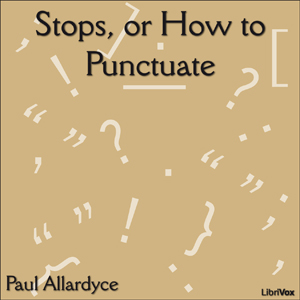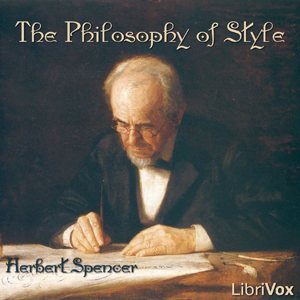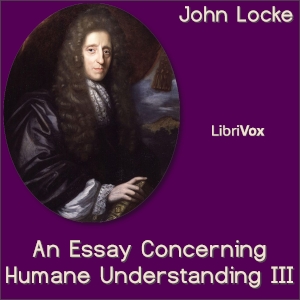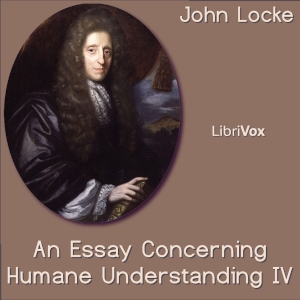Throughout the ages, languages continue to adapt and change. English, being a relatively new language, is a nice example of that. Though the English vocabulary is continually evolving, the system of punctuation has remained constant for the most part. This means that grammar books from 1895 are still applicable today. Therefore, if the following sentence looks correct to you, perhaps listening to Paul Allardyce's "Stops, or How to Punctuate" would be a good idea. (Summary by Shurtagal)
16 episodes
“The Philosophy of Style,” explored a growing trend of formalist approaches to writing. Highly focused on the proper placement and ordering of the parts of an English sentence, [Spencer] created a guide for effective composition. Spencer’s aim was to free prose writing from as much "friction and inertia" as possible, so that the reader would not be slowed by strenuous deliberations concerning the proper context and meaning of a sentence. [Wikipedia]
3 episodes

English Synonyms and Antonyms is basically a vocabulary builder that students might use as they prepare for entrance or exit exams. Each entry gives a list of synonyms, followed by a paragraph that briefly explains or exemplifies the subtle distinctions between the listed words. The entries sometimes close with a few words on the prepositions that follow selected synonyms, but more often with a list of antonyms.
By "synonyms" we usually understand words that coincide or nearly coincide in some part of their meaning, and may hence within certain limits be used interchangeably, while outside of those limits they may differ very greatly in meaning and use. It is the office of a work on synonyms to point out these correspondences and differences, that language may have the flexibility that comes from freedom of selection within the common limits, with the perspicuity and precision that result from exact choice of the fittest words to express each shade of meaning outside of the common limits. (Summary by DSayers and the author from the entry "Synonymous")
68 episodes
"...Showing Curious ways in which the English Language may be made to convey Ideas or obscure them." A collection of unintentionally humorous uses of the English language. Sections of the work: How she is wrote by the Inaccurate, By Advertisers and on Sign-boards, For Epitaphs, By Correspondents, By the Effusive, How she can be oddly wrote, and By the Untutored. (Summary by TriciaG)
4 episodes

Pubblicato nel 1542, questo dialogo espone le teorie sulla lingua italiana che, già dal secolo precedente, presero forma, cercando di trasformare il volgare italiano, ancora instabile grammaticalmente, in una vera e propria lingua regolata da norme. I protagonisti del dialogo sono: Bembo (Pietro Bembo), sostenitore del volgare colto e che prende come modelli il Decameron del Boccaccio e il Canzoniere del Petrarca; Lazaro (Lazzaro Bonamico), cultore del latino e spregiatore dell'uso colto del volgare; un Cortegiano, portavoce della teoria di Baldassarre Castiglione, che propone di aprire il volgare di base toscana alle influenze di altre regioni e lingue; uno Scolare che riporta un dialogo tra Lascari (Giano Lascaris), professore di greco, sostenitore dell'indissolubilità tra concetto e parola, e Peretto (Pietro Pomponazzi - detto Peretto per la bassa statura), filosofo aristotelico, che auspica l'utilizzo del dialetto nell'esercizio dell'attività speculativa, per non perdere tempo inutile nello studio delle parole a scapito delle "cose".(Summary by Riccardo Fasol)
2 episodes
For one, I have never been one of those who apologize for my frank and never-ending delight in mystery stories. Their mazes have led me unwearied through miles of printed pages, and if only the problem has been worth while, and its pursuit has led along surprising ways, past shuddery thickets and over fearsome bridges, my soul has returned to sober affairs refreshed and content. In a word, here is a remarkable volume which shows us how the wheels go round, not by dogmatic statement, but by an amazing breadth and variety of citation and quotation, showing not only what great mystery writers have thought of their art, but illustrating by apposite examples how they secured their effects. - Summary by J. Berg Esenwein, editor of The Writer’s Library published by The Home Correspondence School, from Introduction
27 episodes
This collection of the 195 known, publicly-printed speeches of Mark Twain (Samuel Langhorne Clemens) was compiled by Paul Fatout and published by the University of Iowa Press. The speeches are in the Public Domain, and our thanks go to the University of Iowa for making them available for this Public Domain audio recording. They were compiled in the University of Iowa Press book entitled "Mark Twain Speaking" and are arranged, chronologically, from Twain's first authenticated public speech in 1864, to his last speech, exactly 7 months before he died. Extensive analysis (for instance how other publications interpreted identical interview sessions), notes, appendix and index are included in the printed work.
- Summary by John Greenman
128 episodes
"I am of the company of book men who read simply for the love of it," confesses E. Walter Walters, in this gently written tome. Walters documents his habit of "book fishing--" seeking and finding quality volumes in the discount binds at his booksellers, and as a connoisseur of wine might match varieties with courses, he matches his books with the contexts in which he reads them--in the garden, in the bedroom, with friends. He also provides a list of his favorite authors (mostly 19th century United Kingdom) and favorite books, as well as favorite characters from the books he has read, not in a way to impose his choices on other readers, but to share his own personal experiences. (summary by Dr. P. Gould)
15 episodes
English as She is Spoke is a 19th century Portuguese-to-English phrasebook that has become a classic of absurdist humor, owing chiefly to the apparent fact that its writer had absolutely no knowledge of English. It is thought that for utterly obscure reasons its unknown author, Pedro Carolino, used a dictionary to translate Portuguese words to French, then a second dictionary to convert French to English, producing an incoherent but hilarious result. Mark Twain said of this book, "Nobody can add to the absurdity of this book, nobody can imitate it successfully, nobody can hope to produce its fellow; it is perfect." - Summary by J A Carter
4 episodes
Language: we all use it and few of us think about the form it takes on the page. But how did the transmittal of ideas in written form evolve from Egyptian hieroglyphics to the ABCs in use in most countries around the world today? This work, written by a librarian and scholar, draws on previously published works and also direct correspondence with archaeologists still uncovering secrets in Egypt and Mesopotamia. Her death left this work unfinished, but others were able to polish it for publication. - Summary by Lynne Thompson
12 episodes

"It was part of my daily work, for a good many years, to read the principal English newspapers and reviews; it has been part of my work, all the time, to read the more important English novels, essays, poetry and criticism. An American born and bred, I early noted, as everyone else in like case must note, certain salient differences between the English of England and the English of America as practically spoken and written—differences in vocabulary, in syntax, in the shades and habits of idiom, and even, coming to the common speech, in grammar. And I noted too, of course, partly during visits to England but more largely by a somewhat wide and intimate intercourse with English people in the United States, the obvious differences between English and American pronunciation and intonation.
Greatly interested in these differences—some of them so great that they led me to seek exchanges of light with Englishmen—I looked for some work that would describe and account for them with a show of completeness, and perhaps depict the process of their origin. I soon found that no such work existed, either in England or in America—that the whole literature of the subject was astonishingly meagre and unsatisfactory." - Summary by Mencken (Preface)
49 episodes
Poe’s famous narrative poem and the author’s reflections on its composition. (David Wales)
3 episodes
El autor de este tratado de oratoria, uno de los individuos mas respetados y que figura entre los tres ó cuatro oradores y pensadores mas eminentes del clero francés, al cabo de cuarenta años de continua práctica en el arte de decir que principalmente como catedrático y predicador ha egercitado, ha querido comunicar á sus sucesores los secretos de la profesion en que tanto ha sobresalido. A cuantos estén en disposicion de recibirlo quiere dispensar el mismo servicio que reconoce haber él debido al célebre Villemain al comenzar su carrera. Propónese en cuanto es posible, enseñar lo que los libros no enseñan y comunicar lo que un maestro comunica confidencialmente á sus discípulos predilectos. Summary by Manuel Milá i Fontanals, en la introducción al libro.
26 episodes
The author, an avid book collector, calls for the better protection of books against the "enemies" which lead to their physical destruction. In a series of brief chapters, he details the losses caused by raging fire, floods of water, noxious gases, sheer neglect, ignorant bigotry, invasions of bookworms and other vermin, inept bookbinders, clueless book collectors, clumsy servants, and mishandling by children.
10 episodes
This is the third book of John Locke's Essay on Human Understanding. Book I was Neither Principles Nor Ideas Are Innate. Book II was Of Ideas and Book III is Of Words. Locke is writing about the ideas we have in our minds and the things they are to represent. What does it mean to define a thing? What is an abstract idea? What is motion? What is essential to me as an individual? What would an Englishman born in Jamaica think about ice when he went to England for the first time? What is a concrete term? Locke tackles many such questions in this third book. Book IV is Of Knowledge and Probability. - Summary by Craig Campbell
15 episodes

Dedications is an anthology of the forms used from the earliest days of book-making to the present time. My purpose in the following anthology of dedications has been to make a representative, rather than an exhaustive collection. My first idea was to take only beautiful dedications, and above all those which showed thought and originality. I next sought those which were quaint and curious, grave and gay, and then wandering through the wide field of English literature, tried to have each section of it represented. Dedications which brought one in touch with the world of religion, philanthropy, the fine arts, science, nature and travel have also claimed my attention. Then, narrowing my interest, I searched for those to celebrated people, or by celebrated people, even though the dedications were not particularly desirable in themselves. I was anxious to include great heroes, as David Livingstone, and when unable to obtain dedications to them I substituted books by them or about them. The same was true in regard to certain industrial subjects, as needlework, cooking, etc. Last but not least, I tried to include dedications which were valuable because of their human interest. - Summary by Mary Elizabeth Brown
31 episodes
This is the fourth book of John Locke's Essay Concerning Human Understanding. His book deals with knowledge and probability. He asks how far knowledge can go, if there are universal propositions, what are judgment and probability and deals with faith, reason and enthusiasm. - Summary by Soupy
23 episodes
A description and history of the development of the English Language and reflections on the influences that changed the language. - Summary by barbara2
16 episodes
A history of English words, written for younger readers.
Parental advisory: the text was published in 1918 and includes some ethnicity terms which may cause offense to the modern reader. - Summary by Kazbek
19 episodes

The Ordeal of Mark Twain analyzes the literary progression of Samuel L. Clemens and attributes shortcomings to Clemens' mother and wife. The Encyclopaedia Britannica says, Brooks' work "was a psychological study attempting to show that Twain had crippled himself emotionally and curtailed his genius by repressing his natural artistic bent for the sake of his Calvinist upbringing." Also, Brooks says, his literary spirit was sidelined as "...Mark Twain was inducted (with the success of 'Innocents Abroad') into the Gilded Age, launched, in defiance of that instinct which only for a few years was to allow him inner peace, upon the vast welter of a society blind like himself, like him committed to the pursuit of worldly success." And, still more disturbingly, Brooks maintains... "We shall see that in the end, never having been able to develop, to express itself, to fulfill itself, to air itself in the sun and the wind of the world, it turned as it were black and malignant, like some monstrous, morbid inner growth, poisoning Mark Twain's whole spiritual system. We have now to note its constant blind efforts to break through the censorship that had been imposed on it, to cross the threshold of the unconscious and play its part in the conscious life of this man whose will was always enlisted against it." The implication of all this begs the question, "What might a truly unleashed Mark Twain have produced?" For a recording of a New York Times review of this book, go this link: Review ( John Greenman & Wikipedia)
11 episodes


















